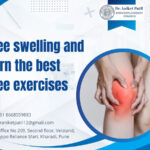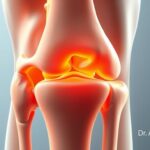Understanding Ankle Swelling: Causes, Reasons, and When to Seek Help
Ankle swelling is a common condition that many people overlook until it becomes painful or affects mobility. Whether you’ve had a long day on your feet or you’re experiencing persistent swelling, understanding the ankle swelling causes is essential for timely treatment and prevention. While minor swelling may resolve with rest, persistent or severe swelling often signals an underlying health concern that needs medical attention.
What is Ankle Swelling?
Ankle swelling, also called edema, is the buildup of fluid around the ankle joint and surrounding tissues. It can occur in one or both ankles and may be accompanied by pain, redness, or stiffness. While temporary swelling due to injury or fatigue is common, persistent swelling may indicate deeper medical issues.
Top Ankle Swelling Causes
There are many ankle swelling reasons ranging from lifestyle factors to underlying medical conditions. Here are the most common causes:
- Injury or Trauma
Sprains, fractures, or overuse injuries are leading reasons for swollen ankles. An injury triggers inflammation, causing pain and swelling. - Prolonged Standing or Sitting
Spending long hours on your feet or sitting for extended periods can lead to poor circulation, resulting in mild swelling. - Pregnancy
Hormonal changes and increased body weight during pregnancy often cause ankle swelling. - Medical Conditions
Heart, kidney, or liver diseases may cause fluid retention, leading to ankle and leg swelling. - Infections
Skin or joint infections near the ankle may lead to localized swelling and redness. - Medications
Some medications, including those for blood pressure or diabetes, may have side effects that result in fluid retention.
Warning Signs: When to See a Doctor
While mild ankle swelling after activity is often harmless, certain symptoms should not be ignored:
- Sudden swelling without injury
- Pain or warmth around the ankle joint
- Swelling that doesn’t reduce after rest or elevation
- Shortness of breath or chest pain (could indicate a serious condition)
- Swelling accompanied by fever or infection
If you experience these symptoms, it’s crucial to seek medical help immediately.
Home Remedies to Reduce Ankle Swelling
For mild cases, the following remedies can help manage swelling:
- R.I.C.E Method: Rest, Ice, Compression, and Elevation are effective for swelling caused by injury.
- Hydration: Drinking plenty of water helps flush out excess salt and toxins that can cause fluid retention.
- Gentle Exercise: Light stretching and walking improve blood circulation.
- Compression Socks:These help reduce swelling, especially for those who stand for long periods.
- Limit Salt Intake: A high-sodium diet can lead to water retention and swelling.
Prevention Tips for Healthy Knees
- Warm-Up Before Exercise: Always stretch before engaging in sports or heavy activity.
- Wear Proper Footwear: Supportive shoes reduce stress on the knees.
- Strengthen Supporting Muscles: Strong thighs, hips, and core help take pressure off the knees.
- Maintain a Healthy Weight: Reduces strain on knee joints.
- Regular Checkups: Periodic visits to an orthopedic doctor ensure early detection of problems.
Medical Treatment for Ankle Swelling
If home remedies don’t work, medical intervention may be necessary. Treatment may include:
- Physical therapy and strengthening exercises
- Anti-inflammatory medications
- Draining excess fluid in severe cases
- Treating underlying health conditions such as heart or kidney problems
Your orthopedic specialist will perform a thorough evaluation to identify the root cause and create a customized treatment plan.
Prevention Tips for Healthy Ankles
- Maintain a healthy weight to reduce stress on your ankle joints.
- Avoid sitting or standing for long periods; take breaks to move around.
- Wear well-fitted, supportive footwear.
- Stay active to improve circulation and joint strength.
- Schedule regular orthopedic checkups, especially if you have a history of injuries or chronic illnesses.
About Dr. Aniket Patil – Expert in Knee Care, Kharadi, Pune
At Dr. Aniket Patil’s Orthopedic Clinic in Kharadi, Pune, we specialize in diagnosing and treating conditions like ankle swelling, ankle swelling causes, ankle swelling reasons, and reasons for swollen ankles. With advanced orthopedic care, personalized recovery plans, and a focus on long-term joint health, we ensure you get the right treatment for pain-free mobility. Whether you’re dealing with swelling from an injury, medical condition, or daily fatigue, our clinic is here to help restore your comfort and confidence.
Tags-: ankle swelling causes in kharadi, ankle swelling in kharadi, ankle swelling reasons in kharadi, reasons for swollen ankles in kharadi, ankle swelling causes in Pune, ankle swelling in Pune, ankle swelling reasons in Pune, reasons for swollen ankles in Pune
Frequently Asked Questions (FAQs)
Ans. Common reasons include injury, prolonged sitting or standing, pregnancy, heart or kidney conditions, infections, and certain medications.
Ans. Yes. Dehydration may lead to water retention, which in turn can cause swelling in the ankles and feet.
Ans. If swelling is sudden, painful, or accompanied by fever, redness, or difficulty breathing, seek immediate medical attention.
Ans. Gentle ankle circles, calf raises, and walking can improve blood flow and reduce swelling.
Ans. Treatment may include medications, physical therapy, compression, lifestyle changes, or addressing underlying conditions like heart or kidney disease.

 Previous Post
Previous Post Next Post
Next Post